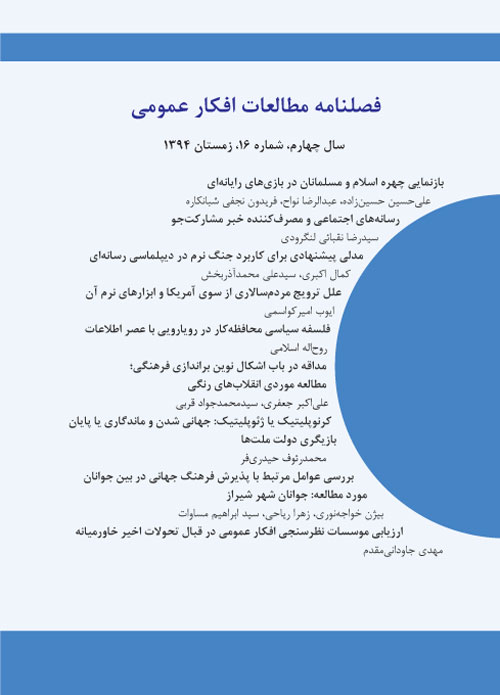فهرست مطالب
فصلنامه مطالعات افکار عمومی
پیاپی 1 (بهار 1391)
- تاریخ انتشار: 1391/03/03
- تعداد عناوین: 7
-
صفحه 31
-
صفحه 149
-
Page 7Political culture is the collection of views and values that form the political process and life. In Iran there is kind of disorder and ambiguity in the interaction between political parties and currents, and the political culture. An analysis of the role of political parties and currents and the effects of the social and political powers on each other and on the political structures is of great importance in the study of the interaction between culture and politics. In the study of the role of political parties and current by the political researchers in the past decades, election issues, the structure of political coalitions and the analysis of policy-makings have been of great importance; however, the role of political parties and currents thus far has not been analyzed from the perspective of political culture. Therefore, the present article aims to study the interaction between the political culture, and the political parties and currents. Lack of a definition of political culture relations and political currents in political competitions, a sketch of cultural engineering, and the cultural engineering of the political culture of the political cultures are among the important findings of this study.Keywords: parties, political currents, political culture, political competition, engineering culture, cultural engineering
-
Page 31With the help of communication tools, developing media literacy and more access to the internet, man has been able create groups and communities which are far from each other, but are quite accessible. Theoretically, media literate individuals are less vulnerable to problems connected with media information, because they can detect messages which are designed and sent, at different levels, with the aim of affecting them. Awareness about the way information is created by the media enables the individuals to enjoy more independence in their own world. When they acquire the media literacy skills, they can turn into more efficient information promoters and bridge the gap between educational programs and social programs.Keywords: media, media literacy, passive audience, resistance
-
Page 83The recent revolutionary changes in the Middle East have had serious effects on the security in the region. The Islamic Republic of Iran, as a key player in the region, has been affected by the changes as well. Therefore, the main question is what is the effect of the recent changes in the Middle East on the security of the Islamic Republic of Iran? The hypothesis is that regarding the formation of social powers and the presence of contending Islamist and secular groups in the revolutionary changes in the Middle East, it seems that the development of the discourse of Islamism and the domination of this discourse on the structure of power in the post-revolutionary political order will strengthen the political dimension of the national security of the Islamic Republic of Iran. The present article seeks to analyze the national security of the Islamic Republic of Iran in the light of recent changes in the region. The present research is descriptive-analytical and aims to utilize the causal explanation method to study the effect of independent variable on the dependent variable. The theoretical basis of this article derives from the interpretations of security in Copenhagen school.Keywords: the Middle East, Arab revolutions, Islamic revolution, Islamism, national security of the Islamic Republic of Iran, Copenhagen school
-
Page 109The components of political rights protect the security and freedom of individuals against the power of others. Rights such as the freedom of opinion and speech enable the individuals to pave the way for their success and progress through exercising their freedom of choice. These rights have been protected at the national level, in the constitution, and at the international level in documents such as the Universal Declaration of Human Rights and the International Covenant on Civil and Political Rights. The present paper seeks to study the constitution of the Islamic Republic of Iran and the international documents in order to analyze the components of the freedom of opinion and speech and its limitations.


